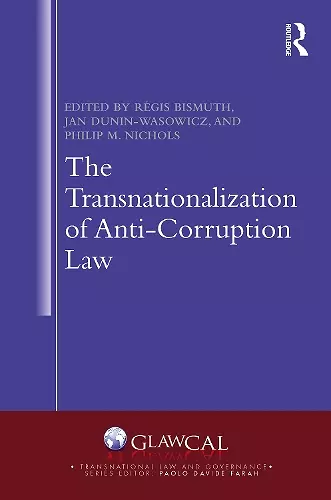The Transnationalization of Anti-Corruption Law
Philip M Nichols author Régis Bismuth author Jan Dunin-Wasowicz author Philip M Nichols editor Régis Bismuth editor Jan Dunin-Wasowicz editor
Format:Hardback
Publisher:Taylor & Francis Ltd
Published:28th May '21
Should be back in stock very soon
This hardback is available in another edition too:
- Paperback£39.99(9781032005447)

The last twenty years have witnessed an astonishing transformation: the fight against corruption has grown from a handful of local undertakings into a truly global effort. Law occupies a central role in that effort and this timely book assesses the challenges faced in using law as it too morphs from a handful of local rules into a global regime.
The book presents the perspectives of a global array of scholars, of policy makers, and of practitioners. Topics range from critical theoretical understandings of the global regime as a whole, to regional and local experiences in implementing and influencing the regime, including specific legal techniques such as deferred prosecution agreements, addressing corruption issues in dispute resolution, whistleblower protection, civil and administrative prosecutions, as well as blocking statutes. The book also includes discussions of the future shape of the global regime, the emergence of transnational compliance standards, and discussions by leaders of international organizations that take a leading role in the transnationalization of anti-corruption law.
The Transnationalization of Anti-Corruption Law deals with the most salient aspects of the global anti-corruption regime. It is written by people who contribute to the structure of the regime, who practice within the regime, and who study the regime. It is written for anyone interested in corruption or corruption control in general, anyone with a general interest in jurisprudence or in international law, and especially anyone who is interested in critical thinking and analysis of how law can control corruption in a global context.
Global anti-corruption laws have come (an impressively) long way since the enactment of the U.S. Foreign Corrupt Practices Act. To wit: in less than five decades, a single national law fighting foreign bribery spawned a true transnational application of anti-corruption laws. For practitioners and academics interested in the fascinating field of global anti-corruption laws, this timely, comprehensive and well researched book reviews different jurisdictions, and encourages new thinking and approaches. It is an outstanding read.
Pascale Helene Dubois - Independent International Anti-Corruption Advisor. Adjunct Professor, Georgetown University Law Center. Former VP, Integrity, World Bank Group.
This publication sheds light on some of the cutting-edge issues raised by the globalisation of the fight again bribery, including: the parameters for multilateral enforcement actions, the way to account for cultural differences in shaping new standards and practices, and the effect of the transnationalization of anticorruption on trade dynamics. Bringing together authors from academia, international organizations, the private sector, as well as civil society organizations, this publication canvasses a wide range of perspectives, providing an invaluable contribution to the discussion.
Patrick Moulette, Head of the OECD Anti-Corruption Division
Elisabeth Danon, Legal Analyst at the OECD Anti-Corruption Division
The book co-edited by Régis Bismuth, Jan Dunin-Wasowicz and Philip Nichols is not only a recognition of how the anti-corruption landscape has evolved in the last twenty years but also charts some of the current and future challenges. Covering a wide range of different issues and combining the point of view of academics and practitioners, this collective book is a must read for anybody interested in understanding how corruption has become contrary to transnational public policy and what does this entails. But, further than that, it also indicates a path for the public international law of the XXIst century. An international law based on a combination of treaty law, jurisprudence and new forms of so called "soft" law through the adoption of instruments which, while non legally binding, represent politically stringent commitments difficult to ignore.
Nicola Bonucci, Paul Hastings LLP, Former OECD General Counsel
ISBN: 9780367853013
Dimensions: unknown
Weight: 453g
584 pages